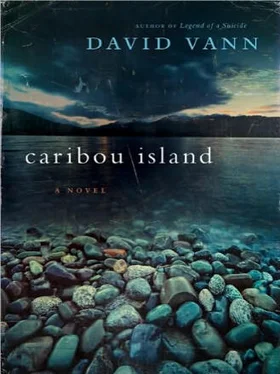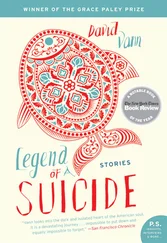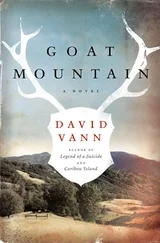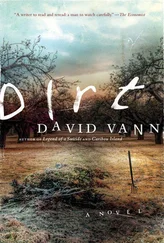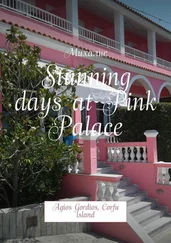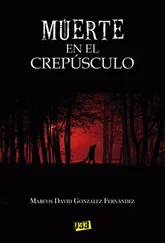Jim laughed. Takes all kinds.
And that’s something we do have here.
Ha, Jim said.
Then it was oddly silent. She couldn’t think of anything to say, and he seemed preoccupied. Looking down at his napkin and silverware. He was a weirdo, plain and simple. She didn’t know why she hadn’t seen that before.
Jim slid out of the booth, slow and awkward, stood a moment, looking at the ground, then got down on one knee. He was holding a small box in one hand.
Rhoda, he said, looking up at her now, and she couldn’t believe this was happening. He hadn’t given her any chance to prepare. He opened the box and showed her the ring, a large princess-cut diamond with smaller diamonds on either side, not a setting she ever would have picked, but there it was, a big diamond. Will you marry me?
He looked afraid. And she felt afraid suddenly. All she had wanted, and none of it was happening the way she had imagined, but it was happening at least. This miserable restaurant, mostly empty, a rainy day, and she smelled like flea bath, her eyes all irritated, but what the hell. Yes, she said. Yes, of course. She stood and he held her and they kissed, the way it should be. The ring on her finger now, looking at it on his shoulder as she held him, her husband, or fiancé. Soon to be. She wanted to tell her mother.
I have to tell my mom, she said.
Yeah, Jim said. We can tell your parents.
But she’s on that island. Rhoda let go of Jim and sat back down. The waiters and waitresses were clapping now, from across that huge empty space. Thank you, Rhoda called out to them, and tried to smile.
Rhoda, Jim said, sitting back down on his side. It’s all right. You’ll be able to tell her soon.
I want to tell her now. I want my mom to know.
Jim looked over his shoulder at the restaurant staff, gave a little wave. Rhoda, they’re going to think something is wrong. You look so unhappy.
I think I’m going to cry, she said, and then she did. She put her hands up to cover her face.
That ended the clapping, and no one came over. Rhoda tried to make it stop, but she wanted her mother to be here, and she was afraid something might have happened. I’m afraid they might be hurt, she told Jim. There’s no way to reach them.
Rhoda, can you stop crying? I don’t want these people to think the wrong thing.
Fine, Rhoda said, pulling her hands away from her face, dabbing at her eyes with her napkin. I won’t embarrass you, since that’s what’s important now.
Rhoda. It’s not like that. They just won’t understand.
I’m going back to work, she said. And she stood up, grabbed her purse and raingear.
Please, Jim said.
I’ll see you this evening. I’m driving out to their house after work.
In all this rain? It’s forty minutes out there, and then the gravel road.
I’ll see you this evening. She marched out the front door without looking at the waitstaff, who were all staring at her, she knew, and ran through the rain to her car, a place where she could cry all she wanted, all the way back to work.
And when she arrived, she wiped her face with Kleenex and no one thought anything was wrong, since her eyes were always puffy here. She could hide. She gave a gray terrier a bath and wondered why she felt so miserable. She loved Jim. She was happy to marry Jim. It was all she wanted, really. But somehow not being able to tell her mother was ruining everything, and she didn’t understand that. She felt empty and lonely and scared when she should be feeling happy.
The afternoon dragged on forever, flea bath after flea bath. She had small bites all up her arms and could feel several in her hair. The smaller dogs, especially, were just flea sponges.
She had to work late, until after seven, time creeping along and no call from Jim, no visit to see how she was doing. She bundled up, hurried through cold and rain to her car, and took the highway toward the lake. The sun low, setting so much earlier now than even a few weeks ago. She ran the heater, had the defroster going on the windshield.
Rhoda was angry Jim hadn’t called or visited, but she tried to stay positive. They’d get married this winter on Kauai, maybe Hanalei Bay. But Rhoda felt tired thinking about any of that. All the years of dreaming, and now that it was happening, she couldn’t even focus on it. Thanks, Mom and Dad, she said. And thanks, Jim.
So much water on the road. A truck came blasting past and threw up enough spray she couldn’t see anything for a moment. Driving blind at sixty. She slowed down.
The bullet-riddled signs for the lake appeared, finally, and she turned onto gravel. She didn’t know why she was coming out here. They weren’t going to be home. She should be with Jim. But she just had to check.
No one else on this road. A long, lonely curve of gravel in the middle of nowhere. The summer traffic ended. Trees blown and bent. Pieces of gravel hitting the underside of the car, the windshield swamped and then clear and then covered again, fogged all along the edges.
She pulled up to her parents’ house and ran to the front door, but no one had been around for a while now. Small branches on the walkway. She banged on the door, but of course no response. Looked down to see weeds in the planter boxes. Colder here than in Soldotna. Dark and windy, close to the mountains and glacier. Rhoda didn’t know what to do. She needed to know her mother was safe.
She leaned against the front door, put her cheek against it, and closed her eyes. She needed to think, but the inside of her was only fear. She could go to the boat ramp. Maybe she’d see something there.
So she drove to the campground. Her dad’s truck in the lot, and nothing else. The sun had set, blocked by rain and cloud, almost no light left. She walked in near darkness down the ramp to the water’s edge. Breaking waves, just as she had imagined, white flashes nearly as high as her head. Steep and packed close together, louder even than the wind as they crashed ashore. The rain stinging her face, cold and slushy, turning into snow.
Damn you, she yelled across the lake. No way to reach them even if she found a boat. Only a few miles away, and sealed off from the rest of the world.
Gary noticed a change in the sound of the rain hitting the tent. Softer now. The first snow, a kind of prayer answered. No roof yet on their cabin, but the snows had arrived. He wouldn’t have thought of it this way before. He would have railed and raged at the early season, felt cheated by time. But now he understood he wanted this. He wanted the snow.
He sat up in his sleeping bag, unzipped quietly.
I’m awake, Irene said. You don’t have to be quiet. I’m always awake.
It’s snowing, he said.
I know. It’s been snowing for hours now.
I’m just going to take a look. He pulled on his pants and shirt, stood in the entranceway of the tent to pull on boots and raingear. The tent still blown by wind, whipping and lurching, but no longer the heavy sound of the rain.
He stepped outside into a deeper cold than he had expected. Not quite October yet, but it felt like October. Not wearing enough beneath his raingear, but he’d only be out here a short time anyway. He bent into the wind and snow and walked toward the water’s edge, wanted to see the waves. Dark out, black, but the waves would be breaking, showing white.
The undergrowth thick, deadwood everywhere. Alder branches lashing at him. The snow cold on his cheeks, melting when it hit. Big flakes, delicate. He wished he could see them.
Through alder to the tufted growth near the shore, thick grasses, and he could see the white of the waves now, fainter than he had imagined, and feel the windblown spray on his cheeks.
Nap nihtscua , darkened night-shadow, northan sniwde , snow from north. This is what Gary loved. Hrim hrusan bond , frost-bound world, haegl feol on eorthan , hail fell on the earth, corna caldast , coldest of grains. His favorite part of the poem, because it was the unexpected shift, a surprise. After all his suffering at sea in storms, the seafarer wants only to go back out again. Nor is his thought for the harp nor for ring-receiving nor the pleasure in woman nor in hope of the world, nor for anything else, except for the surging of the waves.
Читать дальше
